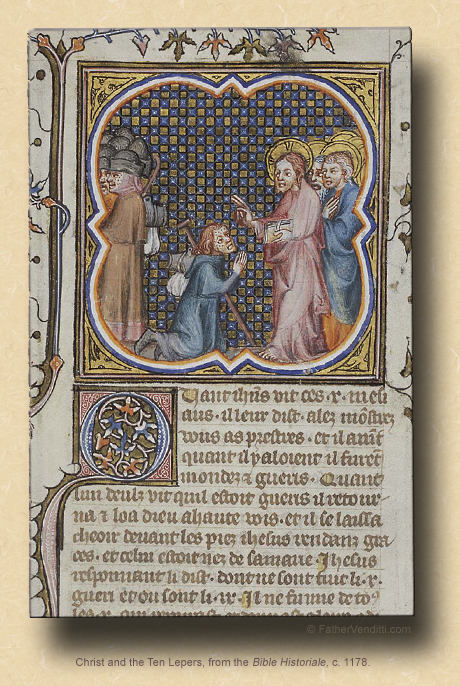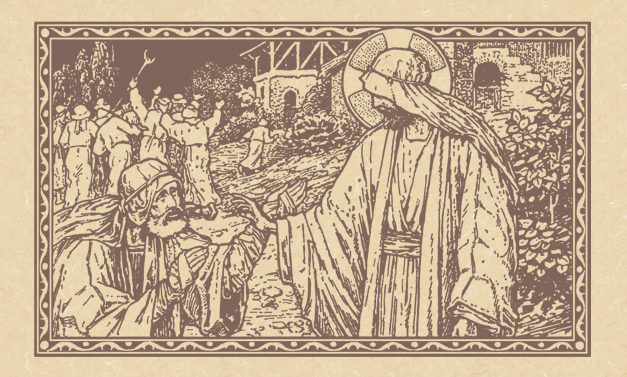Don't Be a Turkey.
The Twenty-Eighth Sunday of Ordinary Time.
Lessons from the tertiary dominica, according to the ordinary form of the Roman Rite:
• II Kings 5: 14-17.
• Psalm 98: 1-4.
• II Timothy 2: 8-13.
• Luke 17: 11-19.
The Twenty-First Sunday after Pentecost.
Lessons from the dominica, according to the extraordinary form of the Roman Rite:
• Ephesians 6: 10-17.
• Psalm 89: 1-2.
• Matthew 18: 23-35.
The Twenty-First Sunday after Pentecost; the Feast of the Holy Apostle James Alpheus; the Feast of Our Venerable Father Andronicus & His Wife, Athanasia; the Feast of Our Righteous Forefather Abraham & His Nephew, Lot; and, the Feast of the Holy Martyr Denis, Bishop of Paris.*
First & third lessons from the pentecostarion, second & fourth from the menaion for the Apostle, according to the Ruthenian recension of the Byzantine Rite:
• Galatians 2: 16-20.
• I Corinthians 4: 9-16.
• Luke 7: 11-16.**
• Luke 10: 16-21.
FatherVenditti.com
|
 9:11 AM 10/9/2016 — Most of you who come here on Sunday may not be aware that it’s been a particularly busy weekend for us here at the Shrine, and we’re all quite fatigued; so, today’s homily will be very short indeed. 9:11 AM 10/9/2016 — Most of you who come here on Sunday may not be aware that it’s been a particularly busy weekend for us here at the Shrine, and we’re all quite fatigued; so, today’s homily will be very short indeed.
Of course the Gospel today focuses on the virtue of gratitude. We’d probably all agree that gratitude is a rare enough quality when it comes to how we deal with one another; but, it’s just as rare, if not more so, in our dealings with God. And today we are presented that incident when our Lord encountered ten lepers and cured them all, but only one came back to give thanks. And our Lord even asked him, “Were not all ten made clean? And the other nine, where are they?” (Luke 17: 17 Knox). And I don’t wonder if that ratio isn’t accurate. We are grateful for maybe a tenth of what we should be grateful for.
It’s easy to focus on what’s wrong with our lives, and everyone has something wrong. There’s no one who wouldn’t say that there isn’t something in his or her life that he wouldn’t want to change somehow. For some it may be something trivial; for others it may be something monumental, like a marriage that’s gone bad, or a child that’s in trouble, or a serious health problem. There’s always something negative that we can think about. And when there’s something wrong, it’s very difficult to put that aside and say, “Yeah, but look what’s right with my life. Look at how fortunate I am aside from this problem.” There’s always something to get depressed about if what you want is to be depressed.
A couple of times you've heard me speak about what we call Spiritual Maturity. A spiritually mature person is one who can receive the crosses given to him in life, not necessarily without hardship, not without difficulty or suffering, not even without complaining sometimes, but without any effect on the strength of his faith. It is said that the first sign of maturity in a child is when he first realizes that mom and dad know better, not because he’s seen the reason of his parents’ position, but because he understands that they are more experienced than he, and therefore understand things that he can’t yet. And that same thing is true in our relationship with God: we can say we are spiritually mature when we can realize that God’s ways are not our ways; and that it isn’t necessary to understand why this or that has happened, except to understand that God has a handle on it even if we don’t. It takes a lot of humility to reach that point in life; but humility is also a function of maturity.
In a little more than a month—believe it or not—our nation will observe that annual day of prayer—at least originally it was supposed to be a day of prayer—which we call Thanksgiving Day, and right after that begins the penitential season of Advent; so, here’s a question you can add to your examination of conscience for both occasions: am I grateful for everything I have received, or do I choose, instead, to brood about what I think has been denied to me?
Last week, when we were all crammed into the Blessed Sacrament Chapel downstairs, I had actually pounded on the podium when I made the point of last week’s Gospel lesson: that reward and punishment do not happen in this life, but in the next, and you all looked at me as if I were a raving lunatic. Well, maybe I am; but, as long as I have breath in me I’ll never stop reminding you that the goal of the Christian life is to serve our Lord in this life so as to be happy with Him in the next; that living the Commandments is not something we do to attain happiness in the here and now, but something we owe to God because He is God; that the short time we spend on this piece of floating space debris we call this world is but a drop in the ocean of eternal life; and, that so long as we live in this world, we are only on a journey, and that the best part of any journey is arriving home.

* Scripturally, James, the son of Zebedee and brother of John the Evangelist, is the one identified as James of Alpheus, the cousin of the Lord; however, some of the Fathers of the Eastern Church, particularly Epiphanius of Cyprus and Gregory of Nyssa, make a distinction between James the son of Zebedee and James the “son of Alpheus.” Others identify James of Alpheus with the apostle known as "James the Less," who is mentioned in the Gospels only once (Mark 15: 40), and who is also identified by many as "the cousin of the Lord," but most identify him with neither the Son of Zebedee nor the "son of Alpheus." For this reason, there are two feasts for the Apostle "James the Greater" on the Byzantine Calendar, and this is one of them.
Andronicus, born in Antioch, became a hermit in the wilderness of Egypt along with his wife, Athanasia. They died at an advanced age toward the middle of the fifth century.
Denis, Bishop of Paris in the third century, was martyred, with his companions Rusticus and Eleutherius, in connection with the Decian persecution shortly after AD 250. A popular legend states that Denis picked his head up after being decapitated and walked six miles while preaching a sermon of repentance the entire way, making him one of many “cephalophores” in hagiography. He is venerated in the Latin Church as patron of Paris.
** In the Churches of the Byzantine Rite, the "Lucan Jump" is in effect for this and the following weeks through December 28th. Cf. the footnote attached to the post here for an explanation.
|

